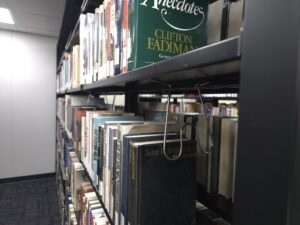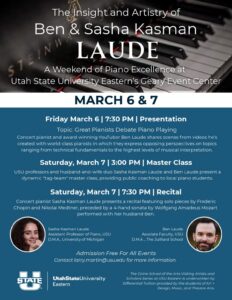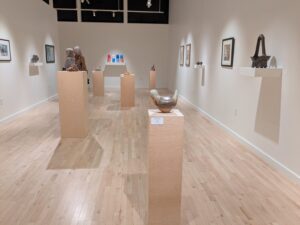Students express concerns on quality of student life
Gypsie Delgado
staff writer
[email protected]
Students, faculty and staff spent three hours on Wednesday, March 9 discussing their perception of campus issues. President Ryan Thomas said this was the most attended meeting between students and staff that he has ever seen, even when he was at UVSC. “I used to offer free pizza and could not get this many students to attend a meeting like this.”
This archived article was written by: Gypsie Delgado
Gypsie Delgado
staff writer
[email protected]
Students, faculty and staff spent three hours on Wednesday, March 9 discussing their perception of campus issues. President Ryan Thomas said this was the most attended meeting between students and staff that he has ever seen, even when he was at UVSC. “I used to offer free pizza and could not get this many students to attend a meeting like this.”
Steve Burge facilitated the meeting. As an attorney, he said that he had moderated hundreds of divorce cases and felt that in many instances, people just want to be heard. He set some basic ground rules that stem from kindergarten etiquette including “no one can criticize another person.” “This is going to take a good faith effort on both parts,” said Dan Wood, CEU’s student body president.
Burge had the students state their goals for the concerns at hand. Six goals they came up with were: see that the concerns are addressed, have greater understanding between students and faculty, let students’ voices be heard, resolve concerns, make sure those resolutions are communicated and have a unified vision.
According to the students who were in attendance, they enjoyed the environment of living on campus and being on campus but had concerns about a lot of things. Students reported the Reeves Building computer lab as being loud and hard to concentrate in. They were upset that the programs in the library and computer labs were not compatible with each other. They also wanted a word processing program installed on the library computers.
Students felt they were not getting what they paid for when they paid the internet usage fee in the dorms. They complained of being intermittently disconnected or receiving no connection at all in many areas of the dorms. Some felt unnecessary firewalls blocked their access to internet-game playing in the dorms. Students were told to buy wireless cards for internet access in their dorms and they are frustrated that they could not get a refund.
One student said he had purchased two wireless cards and still could not get internet accessibility in the dorms for the past two years. He figured he had spent almost $150 and still had not received decent internet connection. Then when he asked for a refund he was declined.
Another student requested a campus-wide login possibility on all CEU computers.
“I have been here for two years. Last year we were able to bring our own furniture and this year we were unable to do so. This has made the dorms feel more like a motel room. Now we have to settle for what I call ‘chastity furniture,’ you can’t do anything for very long on them. They are that uncomfortable.” said Luke Brixley, an Aaron Jones resident.
Though many students are thankful for dorm maintenance employee Hank Savage, they would like to see more timely maintenance on campus. Jenna Lee Richens reported her refrigerator being broken for three weeks right when school started last August, a food loss of $300. They were eventually reimbursed for majority of the food but she felt it could have been handled more efficiently so that the school didn’t have to spend the money to reimburse her. She said she had spent a great deal of time trying to get answers to her refrigerator’s problem and no one seemed to want to help.
“It’s really important that you call Hank and not assume that your RA will call. Hank can’t fix a problem unless he knows about it,” stated Heather Higham, Student Advocate Chair. She felt there was a lack of communication between students and maintenance.
Phone lines were a hot topic. They appear not only to be temperamental in the dorms, but there were also reports from staff and faculty that there were phone problems in the SAC building. Todd Olsen, director of recruitment and scholarships, reported being on a conference call in the Reeves Building when phone lines when down for an hour. Also Rachel VanMeeteren, an RA, said that the phone in the AJ hall director’s office has been down.
Many students were concerned about the locking of the outside doors in the residential halls, the guidelines for room checks, the soda machine being exchanged and a price increase for meal plans of $75 each. They also did not like that there was no more prepackaged food available for them to purchase with their meal cards and that the money remaining on their meal cards did not transfer over from fall to spring semesters. They also complained that the thermostats in the dorms do not work and many leave their windows open all winter to control the excessive heat generated by the furnace.
Dean of Continuing Education, Jim Huffaker, felt that customer service in the dorms was lacking. His workshop attendees complained about asking for linen and fans and never having anyone from the dorms respond to their requests.
The students felt they should be consulted before major changes are made concerning residential life. The majority of students did not like the locking of the doors and felt it upset many students. They felt if there is a theft issue on campus students should lock their individual doors to their apartments. Phil Johnson, in charge of homeland security on campus, said “theft is the biggest problems on campus but they are crimes of opportunity.”
The majority of students agreed on having room checks but are worried that they are not being done efficiently. Kim Ritchie, a Tucker resident, reported seeing mold in some of the dorms as well.
The increase of money for food was upsetting for the students. Some complained that they had too much money that they could not spend what they already had. Others said that because of food prices going up in the cafeteria, they were barely getting by for the semester.
Ritchie also said that she saw people throwing away forks and plates in the cafeteria. Students have to pay for the loss through higher prices in food service.
“Over Christmas break, international students had nowhere to eat while the cafeteria is closed. We’ll probably face this same problem for spring break,” said Brett Coombs, ASCEU VP of Academics. We need to be aware of the cafeteria needs of every individual when we decide which days and hours the cafeteria needs to be open.
Students requested more grab-and-go items, attitude and customer service adjustment by employees and healthier foods and fruit made available at every meal. Some even questioned health code violations in the cafeteria.
Student were concerned over the maintenance of campus grounds, in the buildings and in the dorms. Many reputed their concerns of not being able to recruit friends and family to CEU in the future.
Students came up with many solutions to these problems. Mainly, students would like to see faculty and staff to enforce quiet hours in the library and in the dorms. Coombs suggested putting computers in dorm’s study halls. Eric Mantz, director of computer technology, is very supportive of unifying CEU’s computer system. He also told students that if they are having problems with the internet to put in a work order or come see him about a refund.
Students agreed that there needed to be hall directors living in both Tucker and Burtenshaw Dorms. “There are nights when things are out of control. The only people [RA’s] that are supposed to control it are part of the problem. Problems keep coming up and people don’t know who to turn to. I feel a hall director in those dorms would help solve some of these problems,” said Lisa Barnum, a resident of Burtenshaw.
Students said the social life and quality of life has gone down this year in the dorms and blamed much of the problem on new rules imposed.
On the academic side, students wanted more teacher evaluations. They were concerned over the budget deficits and asked who had to pay for the constant auxiliary deficits. One student complained about an instructor’s unfair grading policy. Others felt good faculty should be rewarded more and weeding out the bad instructors.
Faculty and staff that attended felt that the students had really good ideas and thought we should focus on solutions. “We do consider these things very seriously, we want you to do well. Students are our main priority,” said President Thomas.
“We really do want to respond to your concerns in a timely and appropriate way,” he continued.
Students agreed that they would want a follow up meeting to see if progress was being made. “We are more than happy to hear suggestions, we are trying to address and improve issues,” said Wood.
“We are finally going to the right people,” said Jesse Holt, resident of AJ.
ASCEU already has people working on a few specific areas to help come up with a solution. The goal is to publish the results in the next Eagle newspaper.
“I think it was great to be able to get everyone involved, so that the administration knows exactly how the students feel because some of them don’t know what is going on. It’s the first step to a solution,” Wood added.
He feels the meeting was really effective and will set precedence for the next meeting. “We want to have students more involved in the decision-making process on campus so we don’t have to go back and say these things were awful decisions. That is one of our major emphasis right now,” stated Wood.




